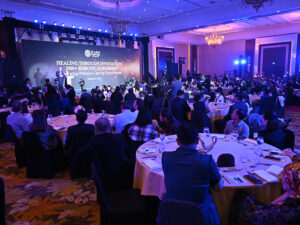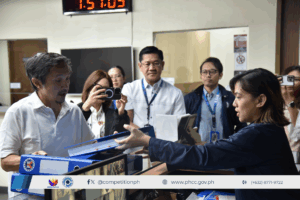THE PHILIPPINE Senate will prioritize removing questionable items from the proposed 2026 national budget after senators raised concerns about anomalous projects under the Department of Public Works and Highways (DPWH).
“The first order of business is assuring that the 2026 budget is corruption-free, and the projects are indeed well-studied and with feasibility studies, and the projects will be felt by the people,” Senator Sherwin T. Gatchalian told Money Talks with Cathy Yang on One News on Thursday.”
During a Senate budget hearing earlier in the week, lawmakers flagged the DPWH’s spending plan, citing projects with similar costs and those that reappeared in the 2026 National Expenditure Plan despite already being funded under the 2025 General Appropriations Act.
Mr. Gatchalian, who heads the Senate finance committee, said some projects divided into phases had identical funding figures, while others seemed to resurface in the new budget.
Senator Panfilo M. Lacson also pushed an executive session with the Department of Budget and Management (DBM) after identifying more than 500 flood control projects in the National Capital Region, Ilocos, Cagayan Valley and Central Luzon that had the same budget allocations.
He noted that 88 projects carried P150 million each, amounting to P13.2 billion; 373 projects were priced at P100 million each for a total of P37.3 billion; and 11 were listed at P120 million each, amounting to P1.32 billion.
The DPWH has one of the largest proposed allocations in the 2026 budget at P881 billion.
“You cannot go to the macroeconomic assumptions, alignment with the Philippine Development Plan,” Mr. Gatchalian said. “If you have projects that are spurious and anomalous — for example, ghost projects — then that will not redound to anything at the end.”
The Department of Finance earlier estimated that corruption tied to flood control projects had cost the country as much as P118.5 billion in economic losses since 2023.
‘IT STARTS WITH THE SYNDICATES’Mr. Gatchalian warned that syndicates within the DPWH continue to play a role in anomalous transactions.
“It really starts with the syndicates, because the syndicates are conniving with the contractors and these people,” he said. “If you look at the budget process, it’s the district engineer that suggests all those line items that we see in the national expenditure program. If those people are conniving with one another, that connivance will end up in our national expenditure program.”
The DPWH has been under close watch since President Ferdinand R. Marcos, Jr. flagged questionable flood control projects in his fourth State of the Nation Address in July.
Since 2022, about P544 billion has been allocated nationwide for flood control, with the top 15 contractors cornering P100 billion of that amount, according to the President. Both the Senate and the House of Representatives have launched investigations.
Mr. Gatchalian said the Senate aims to complete budget deliberations before the year ends to avoid a reenacted budget. “A reenacted budget will definitely have some effects on our economic growth, considering that you cannot spend for capital outlay. So as much as possible, we have to do everything we can to get our budget approved by the end of the year.”
Mr. Marcos earlier warned that he was ready to veto any spending bill that did not align with the administration’s priorities. His economic team, however, cautioned that vetoes or reenacted budgets could stall growth.
Mr. Gatchalian noted that a reenacted budget would block new infrastructure projects and dampen expansion.
The most serious effect would be the absence of capital outlays, which means no new projects — no roads, no classrooms, nothing additional could be built, he pointed out. Since government spending makes up about 15% to 20% of the economy, the impact would be significant.
“If you take out infrastructure spending, that will impact economic growth because government is one of the biggest drivers of economic growth,” he added.
The Development Budget Coordination Committee has proposed a P6.793-trillion budget for 2026, up 7.4% from this year and equivalent to 22% of economic output.
Also on Thursday, Palawan Rep. Jose C. Alvarez told reporters on the sidelines of a budget hearing that the House has withdrawn its request to return the proposed 2026 budget to the Budget department.
The DBM promised to resolve what lawmakers earlier flagged as “erroneous entries” in the spending plan, the congressman, who is vice-chairman of the House appropriations committee, said.
“They (Transportation Secretary Vivencio “Vince” B. Dizon and Budget Secretary Amenah F. Pangandaman) will be the ones to come here and sort things out,” Mr. Alvarez said. “The deliberations will continue so we don’t run out of time.”
On Wednesday, senior party leaders forming the House majority bloc urged their colleagues to suspend participation in hearings until the DBM clarified what they described as “questionable” line items.
The Marcos administration faces pressure to approve a clean and transparent budget amid allegations of fund diversions, questionable public works allocations, and blank entries in this year’s budget.
Reports of substandard flood-control projects amounting to billions of pesos have fueled public outrage and prompted congressional inquiries, eventually leading to the removal of a Public Works secretary.
“The budget is riddled with mistakes,” Mr. Alvarez said.
Nueva Ecija Rep. Mikaela Angela B. Suansing, who heads the House appropriations committee, said hearings for next year’s proposed agency budgets would proceed as scheduled. “We also want to make sure that the budget is passed on time.” — Adrian H. Halili and Kenneth Christiane L. Basilio






